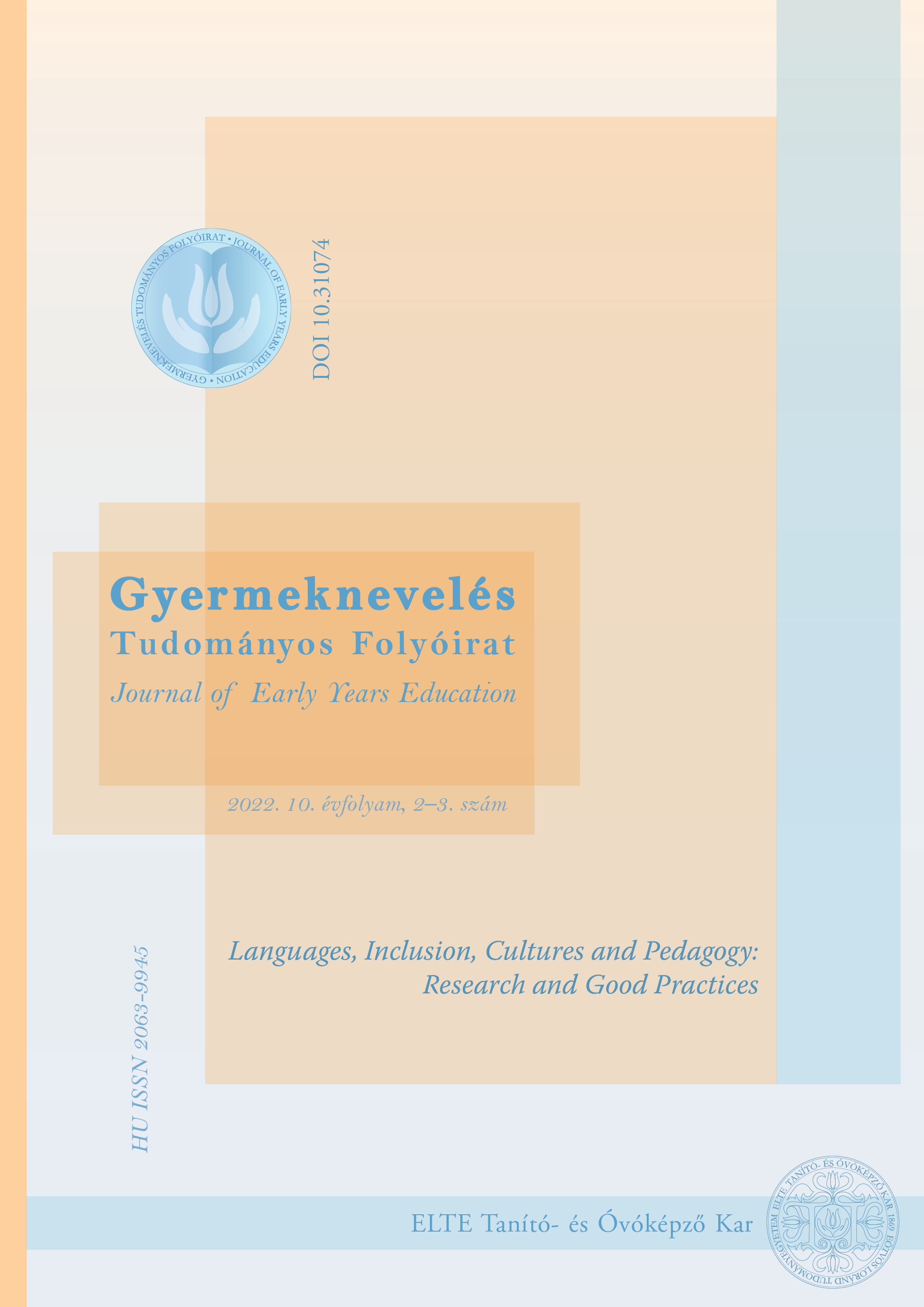Developing cultural awareness in Ethics in Hungary
DOI:
https://doi.org/10.31074/gyntf.2022.2.92.112Kulcsszavak:
primary education, Ethics, morality, culture, methodologyAbsztrakt
In Hungary, the 2012/13 academic year saw the introduction of Ethics [etika], a newly designed subject, into the national curriculum for primary education. Aiming to promote learners’ understanding of individual and social values by means of its subject-matter covering major aspects of the world of human relations, Ethics both directly and indirectly teaches about culture. This paper gives an insight into the character and implementation of the subject while presenting some practical ideas regarding how to develop primary children’s cultural awareness. My analysis contends that the weekly Ethics lesson accomplishes this goal by providing a discursive approach for students to reflect on their personal experience or any knowledge gained in other school subjects. Students can form and express their opinions about news, current events, human behaviour or analyse their own personal dilemmas or genuine conflicts. The variety of the methodological tools promotes learning about culture both implicitly and explicitly from a young age while enabling learners to practise the skills that are needed for displaying cultural sensitivity.
Letöltések
Hivatkozások
Adaskou, K., Britten, D. & Fahsi, B. (1990). Design Decisions on the Cultural Content of a Secondary English Course for Morocco. ELT Journal, 44(1), 3–10. https://doi.org/10.1093/elt/44.1.3
Arnold, M. (1869). Culture and Anarchy: An Essay in Political and Social Criticism. Retrieved August 19, 2021, from http://public-library.uk/ebooks/25/79.pdf
Bennett, M. J. (1993). Towards ethnorelativism: A developmental model of intercultural sensitivity. In Paige, R. M. (Ed.), Education for the intercultural experience (2nd ed., pp. 21–71). Intercultural Press.
Byram, M. (1997). Teaching and Assessing Intercultural Communicative Competence. Multilingual Matters.
Csányi, V. (1999). Az emberi természet: Humánetológia. Vince Kiadó.
Evans, V. & Green, M. (2006). Cognitive Linguistics: An Introduction. Edinburgh University Press.
Fong, E. H., Catagnus, R. M., Brodhead, M. T., Quigley, S. & Field, S. (2016). Developing the Cultural Awareness Skills of Behavior Analysts. Behav Analysis Practice, 9(1), 84–94. http://dx.doi.org/10.1007/s40617-016-0111-6
Géczy, J. & Kamarás I. (2007). Emberismeret az útvesztőben (Géczi János beszélget Kamarás Istvánnal). Új Pedagógiai Szemle, 57, 69–106.
Geertz, C. (1972). Deep Play: Notes on the Balinese Cockfight. Daedalus, 101(1), 1–37. http://www.jstor.org/stable/20024056
Kamarás, I. (2015). Embertan-erkölcstan sztori. Pro Pannónia Kiadói Alapítvány.
Liddicoat, A. & J. Scarino, A. (2013). Intercultural Language Teaching and Learning. Wiley-Blackwell. https://doi.org/10.1002/9781118482070
Pálvölgyi, F. (2009). Az értékközpontú erkölcsi nevelés konstruktív rendszere I. Mester és Tanítvány, 21, 134-151.
Pinker, S. (1997). How the Mind Works. W. W. Norton & Company.
Tennekoon, S. R. (2015). Crossing the Cultural Boundaries: Developing Intercultural Competence of Prospective Teachers of English. International Journal of Scientific and Research Publications, 5(4), 1–18. http://www.ijsrp.org/research-paper-0415.php?rp=P403956
Trivers, R. L. (1971). The Evolution of Reciprocal Altruism. The Quarterly Review of Biology, 46(1), 35–57. https://doi.org/10.1086/406755
Tylor, E. B. (1871/1891). Primitive Culture: Researches Into the Development of Mythology, Philosophy, Religion, Art, and Custom. Murray. https://openlibrary.org/books/OL16703337M/Primitive_culture
UNESCO (2001). Universal Declaration on Cultural Diversity http://www.unesco.org/new/fileadmin/MULTIMEDIA/HQ/CLT/pdf/5_Cultural_Diversity_EN.pdf
Williams, R. (1958/2014). Culture is Ordinary. In McGuigan, J. (Ed.), Raymond Williams on Culture & Society: Essential Writings (pp. 1–18). SAGE Publications Ltd. https://doi.org/10.4135/9781473914766.n1
Documents
[Public Education Act 2011] 2011. évi CXC. törvény A nemzeti köznevelésről. Magyar Közlöny, 2011/162, 39622-39694.
[National Core Curriculum 2012] A Kormány 110/2012. (VI. 4.) Korm. rendelete a Nemzeti alaptanterv kiadásáról, bevezetésérõl és alkalmazásáról. Magyar Közlöny, 2012/66, 10635-10847.
[Framework curricula 2012] A kerettantervek kiadásának és jóváhagyásának rendjéről szóló 51/2012. (XII. 21.) számú EMMI rendelet mellékletei. 1. MELLÉKLET
Kerettanterv az általános iskola 1-4. évfolyamára. Erkölcstan. 2. MELLÉKLET
Kerettanterv az általános iskola 5-8. évfolyamára. Erkölcstan. from https://www.oktatas.hu/kozneveles/kerettantervek/2012_nat
[National Core Curriculum 2020] A Kormány 5/2020. (I. 31.) Korm. rendelete a Nemzeti alaptanterv kiadásáról, bevezetéséről és alkalmazásáról szóló 110/2012. (VI. 4.) Korm. rendelet módosításáról. Magyar Közlöny, 2020/17, 290-446.
[Framework curricula 2020] A 2020-as NAT-hoz illeszkedő tartalmi szabályozók. Kerettanterv az általános iskola 1–4. évfolyama számára, Etika 1-4 évfolyam. Kerettanterv az általános iskola 5–8. évfolyama számára, Etika 5-8 évfolyam. https://www.oktatas.hu/kozneveles/kerettantervek/2020_nat
References to Figures
Year 1: Fenyődi, A. & Pénzesné Börzsei, A. (2013). Az én világom 1. AP-011801. Apáczai Kiadó.
Year 4: Fenyődi, A. & Pénzesné Börzsei, A. (2016). Az én világom 4. AP-041801. Oktatáskutató és Fejlesztő Intézet.
Year 5: Alexandrov, A., Dobszay, A., Fenyődi, A., Jakab, Gy. & Szecsődi, T. (2016). Etika tankönyv 5. FI-504030501. Eszterházy Károly Egyetem.
Year 6: Alexandrov, A., Dobszay, A., Fenyődi, A. & Jakab, Gy. (2016). Etika tankönyv 6. FI-504030601. Eszterházy Károly Egyetem.
Year 7: Alexandrov, A., Dobszay, A., Fenyődi, A. & Jakab, Gy. (2017). Etika tankönyv 7. FI-504030701. Eszterházy Károly Egyetem.
Year 8: Alexandrov, A., Dobszay, A., Fenyődi, A. & Jakab, Gy. (2017). Etika tankönyv 8. FI-504030801. Eszterházy Károly Egyetem.
##submission.additionalFiles##
Megjelent
Hogyan kell idézni
Folyóiratszám
Rovat
License
Copyright (c) 2022 Szerző

This work is licensed under a Creative Commons Attribution-NonCommercial-ShareAlike 4.0 International License.

